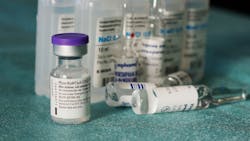Antibodies improve in quality for months after COVID-19 vaccination
Antibodies elicited by COVID-19 vaccination become steadily more powerful for at least six months after vaccination, according to a study by researchers at Washington University School of Medicine in St. Louis. The study involved the Pfizer-BioNTech COVID-19 vaccine and was described in a news release.
The findings suggest that declining antibody levels in the months after vaccination primarily represent a shift to a sustainable immune response. Producing vast quantities of antibodies burns a lot of energy. The immune system cannot sustain such a high level of activity indefinitely, so it gradually switches to producing smaller amounts of more powerful antibodies.
Even quite low levels of antibodies would continue to provide some protection against disease, the researchers said — as long as the virus doesn’t change.
“If the virus didn’t change, most people who got two doses of this vaccine would be in very good shape,” said senior author Ali Ellebedy, PhD, Associate Professor of Pathology & Immunology, Medicine and Molecular Microbiology. “The antibody response we saw is exactly what we’d expect from a robust immune response. We never thought that six months following that second injection, many people would still be actively improving the quality of their antibodies. To me, that is remarkable. The problem is that this virus keeps evolving and producing new variants. So, the antibodies are getting better at recognizing the original strain, but unfortunately the target keeps changing.”
Six months after vaccination, the antibodies were noticeably better than they had been in the beginning. In one set of experiments, the researchers found that only 20% of early antibodies bound to a protein from the virus. Six months later, nearly 80% of antibodies from the same individuals bound to the viral protein.
The quality of the antibodies, of course, is measured against the original virus that was used to design the vaccine. If a new variant is different enough from the original, it may be able to escape once-powerful antibodies. Ellebedy and colleagues have begun studying the effects of variant-specific boosters on the antibody response to vaccination.

